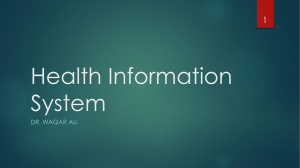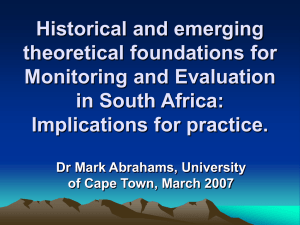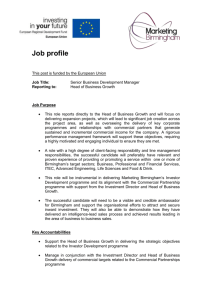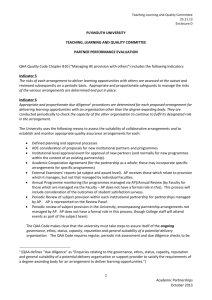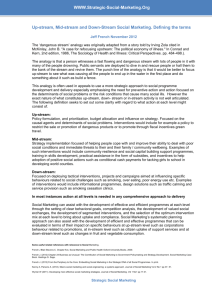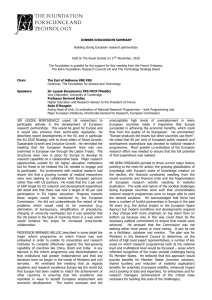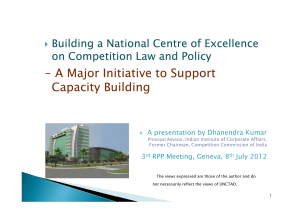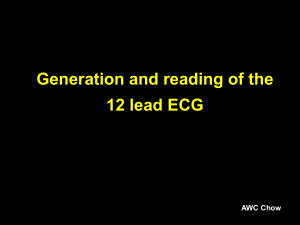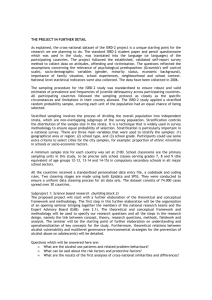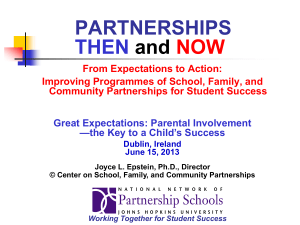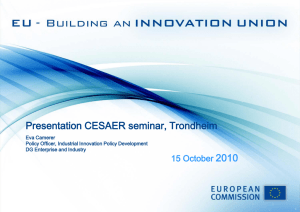生涯規劃
advertisement
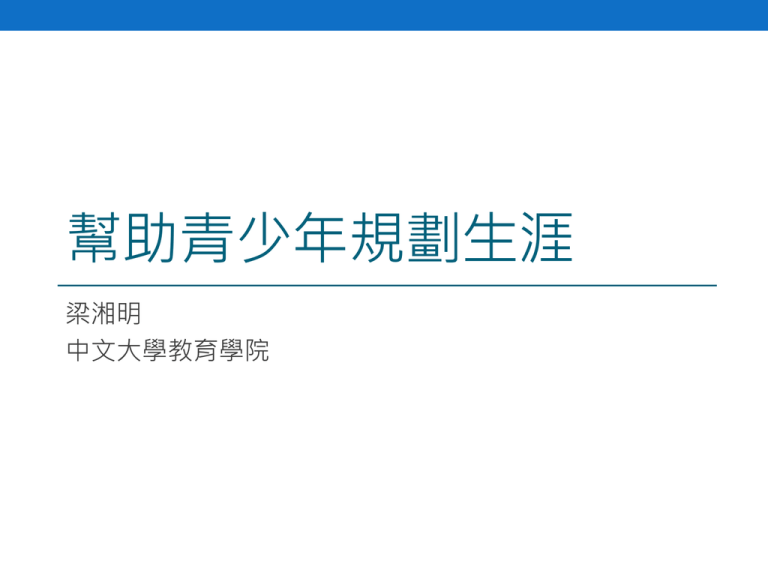
幫助青少年規劃生涯 梁湘明 中文大學教育學院 Themes Covered in This Talk 1. Why do we need to help students plan their life/career 2. Career guidance in school setting – some suggestions 3. Some observations on “effective” schoolbusiness and school-parent partnerships • Part I: A common Question: Why is there a need to help students plan their career/life? • Can students do it on their own (生涯規劃會自 然地發生)? Today’s Young People are Facing Many Complex Choices ….. On the 2015 JUPAS programme list, there are 229 “Bachelor's Degree Programmes” A total of 26 institutions offering a large variety of associate degree courses (or high diploma programmes) [學友社 Hok Yau Club Website} Dictionary of Holland Occupational Codes The Dictionary lists Holland Codes for 12,860 Occupations. The O*NET occupational taxonomy system (USA Department of Labor) currently includes 974 occupations based on data collected from job incumbents or occupation experts. The taxonomy is periodically revised (last revision was in 2010). We do not know how many occupations there are in Hong Kong, but the Qualification Framework gives us a glimpse into the complexities Young People Need: • Skills to make decisions • Self-reflective skills to understand who they are • Skills to assess knowledge and information • A set of positive attitudes, a persistent mindset to implement their actions • Not just for the immediate decision and transition, but for many future decisions required and transitions to come Career Guidance Was Found to be Effective: • OECD “Career Guidance and Public Policy: Bridging the Gap” (2004): • The findings were overwhelmingly positive: of the 40 studies …… positive results were reported for each main type of guidance intervention: classes and courses, workshops and groups, individual guidance, test interpretation and feedback, experience-based interventions, and multi-method interventions….. (p.34) • …. In the United States, career education programmes have shown some modest but positive effects on various measures of academic attainment. (p.35) In Singapore: ECG plays a critical role in preparing students for the world of work by equipping them with the skills to remain relevant in the global economy and lead purposeful lives. Research has shown that ECG programmes can positively impact academic performance leading to optimal education and career decisions. From http://www.moe.gov.sg/education/programmes/social-emotional-learning/educationcareer-guidance/> PART II Career Guidance in School Setting – Helping Students to Plan their Career and Life • #1 Overall Objective: Developing Career Planning and Management Competence Development/Cultivation of career planning skills and competence, not to just cope with immediate decision and transition • #2 Approaches and Strategies – Multiple interventions embedded in the curriculum and experiences of secondary education, including but not limited to: • • • • • Infused into subject curriculum, when appropriate Career and life planning classes/lessons Career assessment Learning from experience (or experiential learning) Job/work experience (e.g., internship, short-term job taster) • Individual and small group planning sessions • Individual and group counselling • Mentoring and peer advising . In Taiwan, career and life planning is a part of the senior high school curriculum In Singapore ECG lessons for the Primary 3 to 6 levels have been incorporated into the Form-Teacher Guidance Period (FTGP) package since 2012. For the secondary levels, ECG lessons are conducted as a module under the Character and Citizenship Education (CCE) curriculum. These lessons are developmental and progressive in nature. • #3: Staff and school have to be involved: • Requires a whole-of-school approach, different teaching staff would play a role (may not be the same) • Teacher training and development (vital to success) • School planning (strategic plan for 3-5 years) • Evidence-based practice • #4: Career guidance also has an important role in addressing the needs of students at risk and early school leavers • The importance of integrated service, integrating psychological, educational, and career interventions • Can benefit much from work-place experience • Service from inter-disciplinary team and partners, working collaboratively PART III Some Observations on Partnerships: Business partners, parents 22 A Recent Documentary/Movie 23 • 香港的教育體系, 按學生的成績劃分 他們到不同組別的學校, 以致在低組 別學校唸書的學生,因成績稍遜而飽受 輕視,被標籤和邊緣化。但巧得很,紀 錄片《爭氣》的拍攝對象,就是這樣一 群來自低組別中學的學生,再加上幾位 來自盲人學校的失明孩子,最終便有了 這部電影《爭氣》,希望它能對社會起 到一點警醒作用。……. (導演楊紫燁 Ruby Yang) • (Some) Observations on school-business and school-parent partnerships • Observation #1 Working together in collaboration (not an out-sourced compartmentalized experience) 25 • Observation #2: Opportunities to participate in relevant, challenging tasks, under the “wings” of a caring community who work together in partnerships: • who “believes” in students (their potentials, human worth, and their ability to change) • who loves students and will not give up • who holds students with high expectations and insist on choosing to do things “right” • who respects, listens to, and encourages students to pursue career and educational goals • Obseration #3: An Experience that could transform the lives of all involved (in different degree, and in the course of time) 27 • ….. 事實證明,電影不僅能記錄,也在介 入,而學生們反過來給我許多思考和感觸。 拍攝《爭氣》期間,我天天接觸這八十多個 孩子,自己好像變成了一個輔導員,用電影 療法介入了他們的生命,有幸聽到他們鮮有 機會表達、也鮮有機會被傾聽的感受和聲 音,這是一般的紀錄片不會觸及的環節。 (導演楊紫燁 Ruby Yang) • 子諾在演出完結後對媽 媽說出心底話: • 「媽媽不敢在人前公開 孩子是盲了 ….. 」 • 「爸爸,媽媽,我一早 已經接受了失明的事 實,希望你們也能接 受 ……」 • 「我只是無了隻眼,又 不是無了條命 ……」 • 媽媽哭了,說: 孩子教番 我地轉頭。 29 School-Business, School-parents Partnerships – Already Taking Places in Many Schools • 《爭氣》: 用態度改變世界 以音樂 蛻變人生 • 以 _____ 蛻變人生 (a goal that could be achieved through partnership) The EDB Business-School Partnership Programme (since 2005) is a case in point: • It provides valuable work place experience for students (e.g., visiting work place, job shadowing) • 2014-15 – 90 business partners joining the BSPP, 700+ activities for 250,000 students. • Most likely it would not be a dramatic as “My Voice, My Life.” Yet the lives of all participants would have to be touched, and they all grow from the experience. • I look forward to listening to your stories today. • Thank You!
